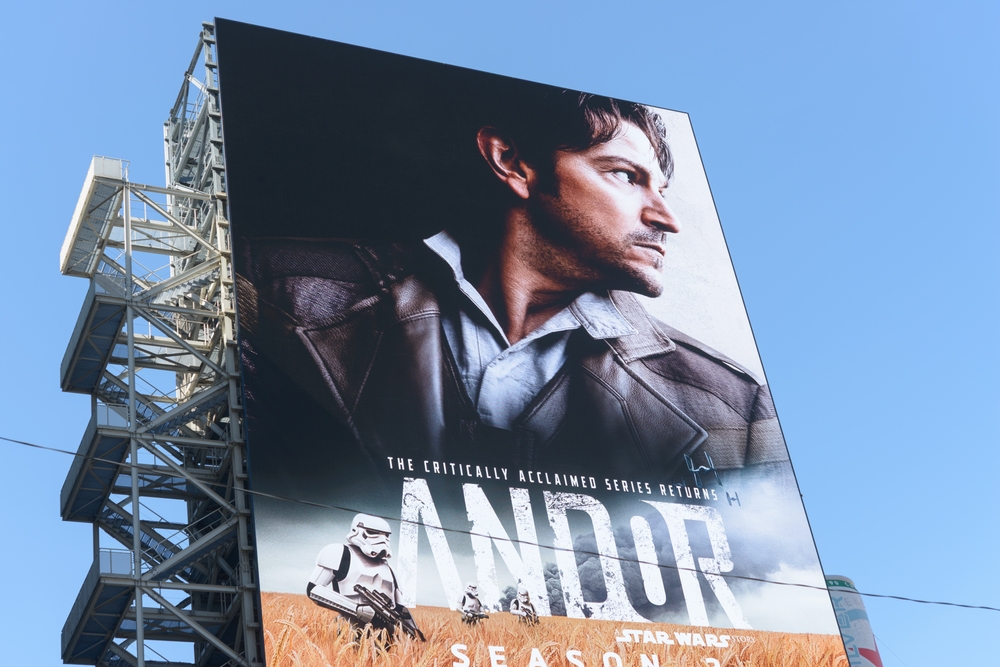
Whittaker Chambers couldn’t have predicted that his defection from the Communist Party would start because of a toddler. It was the 1930s, and Chambers—an American spying for the Soviets—was watching his young daughter messily eat in her high chair.
“My eye came to rest on the delicate convolutions of her ear—those intricate, perfect ears,” he later wrote. “The thought passed through my mind: ‘No, those ears were not created by any chance coming together of atoms in nature (the Communist view). They could have been created only by immense design.’”
It was the beginning of his conversion from communism to Christianity.
Starkly distinct in tone from the original Star Wars trilogy, the Disney+ series Andor portrays a world where all transcendence has been erased by an authoritarian state that wishes to eliminate any appeal beyond itself. In Andor’s world, everyone is compromised in some way. The Empire fetishizes order at any cost; the Rebellion is willing that innocents suffer in order to bring about revolution. Spies sacrifice all hope of “kindness, kinship, love” for the glorious cause.
Yet Andor, at its heart, understands that political power must ultimately yield to the delicate convolutions of a child’s ear. As evidenced by the final shot of the show, the only possible resolution is in new birth. And this theme continues into Rogue One, where a father’s love is what brings about victory.
Across two seasons, Andor followed the transformation of a scrounger named Cassian Andor (Diego Luna, whose wide-eyed intensity makes him seem more boyish than he is) into a ruthless and self-sacrificial spy. Since this is a prequel to Rogue One, we know he will eventually become a member of the Dirty Dozen–style gang that dies to bring about the destruction of the first Death Star. But what could cause a person to change so much?

Cassian’s ennui at the beginning of the story is the common state of people in an oppressed world. He doesn’t want to take risks.
“Better to live. Eat, sleep, do what you want,” he argues. In the first episode, he guns down a corrupt policeman who’d tried to mug him, but who was at his mercy. Like Moses, Cassian flees the scene of this murder, only to find his safety complicated when he’s swept into a scrappy rebellion by two-faced patriarch Luthen Rael—the good-bad man holding the fight against the Empire together. Somewhat George Smiley, somewhat Ethan Edwards. A spymaster by night, a Coruscanti antiquities dealer by day.
It’s obvious that Luthen is no saint, but our first reaction is awe: finally, someone who knows how to take charge of a room. Luthen, played by gravel-voiced Swede Stellan Skarsgård, brings a thrilling jolt of—if not righteous, then audacious—agency. He lays down the gauntlet, arguing that while Cassian commits petty crimes to assert his independence, none of that means anything if he’s fighting for himself alone.
“Wouldn’t you rather give it all at once for something real,” he asks, “than carve off useless pieces until there’s nothing left?”

Luthen’s offer of purpose means more to Cassian than just a job offer. Cassian’s an orphan. Originally from a tropical world where the colonizing brutality of the Republic stripped away his natural family, Cassian and the other native children evoke a Rousseauian vision of humanity in its infancy—noble savages. Yet Cassian’s desire to return to this state is increasingly portrayed as folly. Was his memory of this orphaned childhood even as happy as he recalls? Reversion to innocence can’t be the answer.
Ultimately, what Cassian, and all the characters, need are parents—models from whom they will learn to mature into leaders themselves. “You’re thinking like a thief,” Luthen challenges him. “I’m thinking like a soldier,” Cassian responds, identifying with the masses. Luthen ripostes, “Think like a leader.” (Cassian ultimately rejects the false choice. He thinks like a father, joining Jyn Erso’s cause, and dies to enable the sunrise for the child he will never know he has.)
As much as the show, like all left-coded media, romanticizes the overthrow of authorities, structures, and systems, it is still honest enough to recognize that the first humans were parents. There must be some authority, some choice, some guiding force that is personal.
Family is so necessary that even imperial bureaucrats aspire to it, in their own broken ways. Syria Karn (Kyle Soller) withers under a hen-pecking mother, yet finds a strange comfort in the arms of the ferocious Dedra Meero (Denise Gough), raised in “an imperial kinderblock.” They’re monsters, but they’re shaped by a fundamental dearth of affection.

But of course, affection is as inconvenient as it is necessary. “It’d just be easier if I was all alone,” Cassian challenges Luthen when the latter tries to drive a wedge between him and his lover, Bix Caleen (Adria Arjona), in season 2. Luthen’s noncommittal shrug of assent says it all.
Parenthood is a challenge to the political animal—it turns us away from the detachment necessary to rule. Parents partake of their child’s vulnerability. A family exists contra mundum—a challenge to the absolute power of the state. And yet, without the family, the state has no point. What point is there in anything without children? Paradoxically, while they awaken a sense of fragility in parents, children also incentivize their protectors to take great risks on their behalf. Love incentivizes courage.
Perhaps that’s why Luthen calls himself a coward. He feels hopelessly compromised by the choices he’s made, as he reveals in a magnificent, masochistic soliloquy on sacrifice as self-erasure.
“I’ve made my mind a sunless space,” he says. “I’m damned for what I do. … I yearned to be a savior against injustice without contemplating the cost. And by the time I looked down, there was no longer any ground beneath my feet. … I burn my life to make a sunrise that I know I’ll never see.”
He expects everyone else to adopt a similar scorched-earth policy for their personal life. But of course, he’s denying the true reason he felt drawn to Cassian. When he tries to recruit him early in the first season, it’s clear that he sees something of a son, whether or not he understands that himself. For the rest of the first season, he resists this idea, trying to harden himself and sever all ties. The only safe, tactically wise life is one with “no loose ends.” He allows the slaughter of allies to prevent the exposure of a deep-cover source.
But a conversation with that very deep-cover source—Lonni (Robert Emms)—reveals the truth. “I didn’t know how it would feel,” Lonni says, speaking of becoming a father. Fatherhood has transformed his relationship to the world around him and weakened his devotion to the revolution. Luthen sees this as a liability.
Happily, Luthen is not the final word on the matter. Revolution ultimately does take more than just commitment to a cause—it takes love. Luthen’s foil as a parent is the woman who raised Cassian, Maarva (Fiona Shaw), an arch-revolutionary of a different sort, fueled by love and not hate. When the elderly woman declares that she won’t flee the Empire but rather find a way to resist it, Cassian can’t understand. “I’ll be worried about you all the time,” he cavils.
She replies, “That’s just love. There’s nothing you can do about that.” Off his look of disbelief, she adds, “I’ve never loved anything the way I’ve loved you.”

It’s a startling moment of sincerity in a series that often hands the mic to the most cynical of political operators. But it’s central to what the show is about. Andor’s characters aspire to become perfectly efficient political automatons but are handicapped (and paradoxically fueled) by their need for family and community. “I have friends everywhere” is a Rebellion code phrase that grows in meaning with every repetition.
Even Luthen has to learn this lesson. On his way to kill Cassian, severing a final loose end, he hears Maarva give a posthumous, holographic speech that epitomizes what a love-fueled politics really is. It ought to be the least persuasive piece of rhetoric imaginable, coming from a dead woman who offers no power to back up her words. In life, she executed not one effective act of political resistance, but in death—beyond death, in fact—she prompts us to reconsider this legacy.
Rejecting detachment, Maarva begins her own eulogy by grounding herself in location, tradition, and culture. Rejecting selfishness, she explains that what she wants is not glory but to empower future generations. Her political vision is grounded in family inheritance—in local community—in ownership.
The missing ingredient, of course, is parental love. But this speech comes right after another, private message to her son. They parted on bad terms, but she assures him that whatever he’s done (and an undercurrent of the season is his neglect of his home, chasing after a sister who probably died years before), she loves him unconditionally.
“I love him more than anything he could ever do wrong,” she declares. It’s the thing that finally pushes Cassian over the edge. He’s joining the Rebellion.
What Maarva’s speech rouses in Luthen is that attachment can also be—must be—the most powerful motivator for freedom. He knew this, despite himself. Ultimately, as the mainstream Rebellion pulls away from his control in season 2, leaving him as its embarrassing progenitor, a spy whom no one trusts or supports, we discover that his claims of detachment were never as pure as he pretended.

It was only when, as a broken and complicit soldier of the Empire, he saw the delicate features of a girl’s face that he realized he had true moral agency—and so resolves to save her.
It is this act of grace that gives us permission to overlook the blood on his hands and focus instead on gratitude. After all, every revolution tries to bury the memory of its lawless origins under layers of myth. “Print the legend,” one can imagine the historians of the New Republic concluding, as they polish a bust of Admiral Akbar. But even an imperfect father can be a reflection of the ultimate one.
For why, in the end, does love for children make such a tremendous difference in the humanity of our politics? Is it mere sentiment transforming this crude matter into luminous beings?
The most frightening thought is that the world has a ceiling of steel—imperial steel, beyond which no transmissions can reach. “Nobody’s listening!” Cassian screams in the crisp white prison of Narkina 5. (Critics often identified the sequence as satirizing Amazon work conditions, but it shares far more in common with Xinjiang. It’s worth noting that Andor is tremendously popular in China.)
But the characters, whether or not they can explain why, know there’s something out there, listening. Historicistmaterialists like the rebel Karis Nemik (Alex Lawther) believe in the forces of history, that one day the proletariat will swarm the defenses of the bourgeois borg, like drops of water building to overpower a dam. Mon Mothma (Genevieve O’Reilly) appeals to “objective reality,” lamenting that truth is lost. Bix becomes persuaded that there is goodness deep down things and that Cassian’s journey is shaped by this supernatural force.

“I make my own decisions,” Cassian asserts. Luthen muses, “Is that what you’ve been doing? Sometimes I wonder.”
This is, in the end, the answer to the puzzle. Meaning can only proceed from an ultimate, personal source of truth and love, the treasury from which our terrestrial currency draws its value. It assures us that there is a witness to the death of every human being, no matter whether they are, as they are termed by one Rebellion extremist, “unloved, hunted, cannon fodder.” Each child’s value is affirmed by the nature of a cosmic father.
As Cassian staggers to the shore where he will die in a nuclear blast, he asks his fellow Rebel, “Do you think anybody’s listening?”
She says, “I do.”
He replies, “Your father would have been proud of you.”


